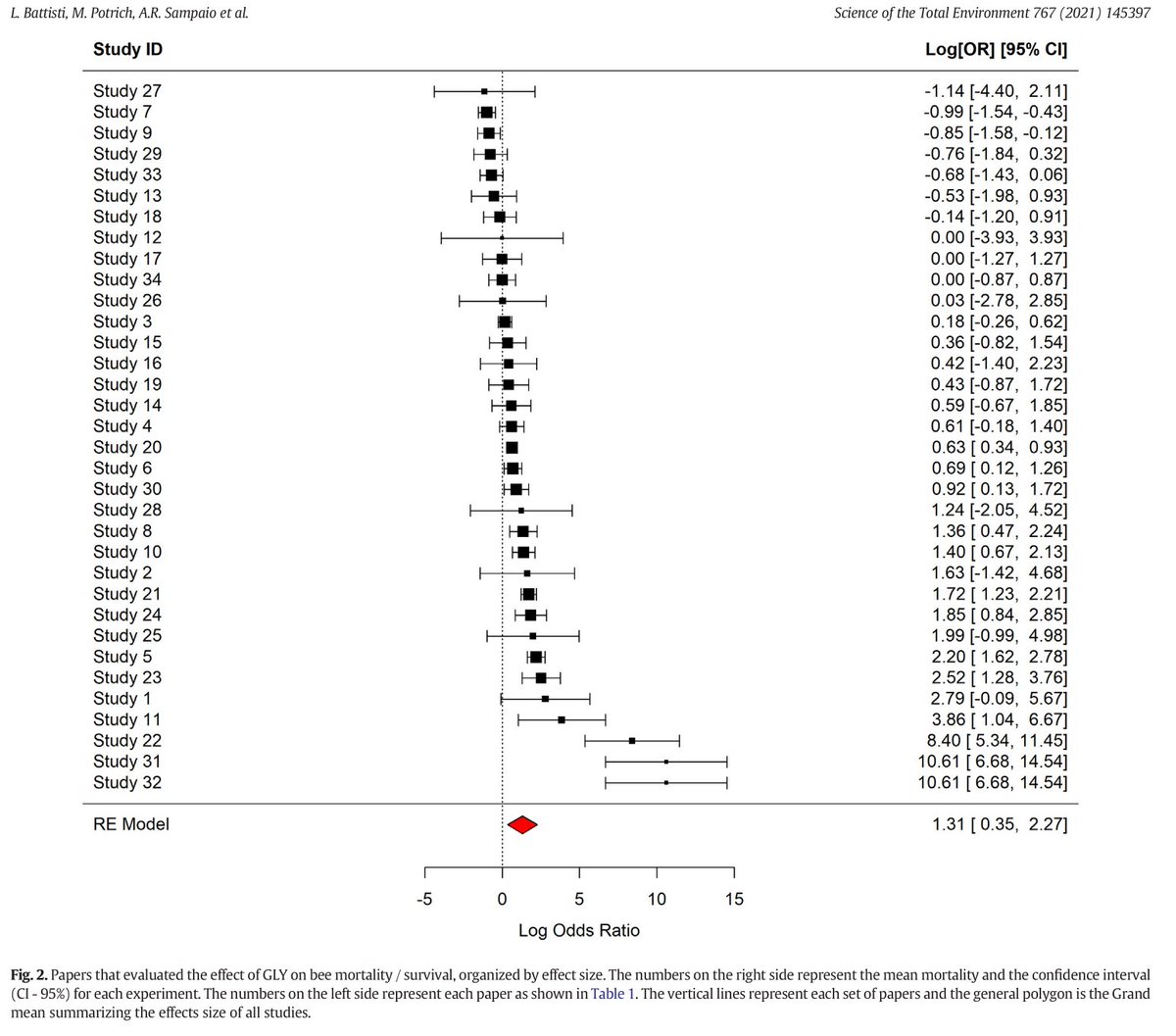
Is glyphosate toxic to bees? Why the new meta-analysis (Battisti et al., 2021) doesn't answer this question and what it really shows --> (Hint: it's co-formulants) 1/13 

This question is very important as glyphosate is the worlds #1 pesticide active ingredient, and comes with no bee protections at all. The authors conclusions, as visible in the above figure, are that glyphosate overall is toxic to bees. 2/13
Now this assertion is a huge one to make, and to label the #1 pesticide in the world as 'toxic to bees' requires a huge amount of evidence to support this. Sadly this paper cannot support it's own conclusion because they've ignored co-formulants 3/13
From the forest plot above you can see that papers 21, 23 and 24 have a heavy pro-toxic weighting. So let's take a look at those papers 4/13
Paper 21 (the excellent Motta et al., 2020) explicitly finds that glyphosate is not contact toxic to bees. They do however find Roundup is toxic, so we can infer it's the co-formulants being toxic, not the glyphosate. 5/13 

Same problem with Paper 23, 24 (Abraham et al., 2018) which finds contact toxicity with a glyphosate product (Sunphosate). It's the almost certainly the surfactants killing the bees.
See this paper showing how toxic surfactants can be to bees:
nzpps.org/_journal/index…
6/13
See this paper showing how toxic surfactants can be to bees:
nzpps.org/_journal/index…
6/13
So it is true a glyphosate based herbicides can cause mortality in bees, but to attribute that to glyphosate is flatly wrong. The emphasis should be put on the substances causing the toxicity which in this case are co-formulants. 7/13
Currently they have an article called 'Is glyphosate toxic' and their data says 'maybe, but co-formulants are definitely toxic'. I'd be very keen to see this analysis re-run with an active ingredient vs formulation parameter included. 8/13
Glyphosate products can be re-formulated to not use toxic co-formulants. So it's not fair to say 'but they're still GLYPHOSATE based products'. We need to correctly identify the problem and respond appropriately. 9/13
Namely: RESEARCH CO-FORMULANTS and REGULATE CO-FORMULANTS! 10/13
Now I've only chosen a few example papers here, not a comprehensive analysis. They don't share their proper dataset so I can't do a deep dive or re-run the analysis. 11/13
To be fair to the authors they do mention glyphosate AND it's formulations. But the main thrust of their paper and title is about glyphosate, so I think my critique is fair. 12/13
To conclude: Glyphosate may still be toxic to bees, but this meta-analysis doesn't show that. Co-formulants can cause alarming levels of mortality, particularly contact toxicity from surfactants. 13/13
I'd also point out that the data extraction in this paper is dubious. Paper 21 in particular appears to have been coded entirely wrong (0.1% Roundup was found to be non-toxic, but in the meta-analysis it shows a strong effect?). They also ignored regulatory data, why? (bonus)
FYI I chose to make this a separate thread to @LynnDicks's popular tweet so it didn't appear I was criticising her for rightly raising the issue of how important glyphosate and bees is. Might be of interest to @JeffOllerton and @drmilky1 (bonus)
• • •
Missing some Tweet in this thread? You can try to
force a refresh


